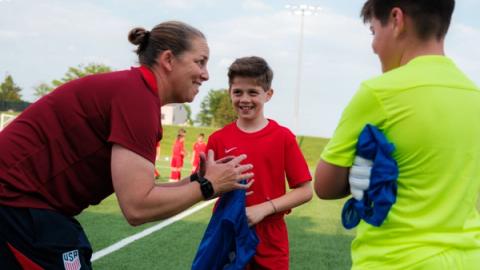What Makes Soccer Fun and How Parents Can Help

We all want our kids to have fun, right? Surprisingly, that’s not always the case! When I hold workshops for parents and we are discussing the concept of “fun” I usually have a parent who speaks up and says: “I want my child to work hard and be challenged, I don’t want them to have fun.”
Fallacies of Fun
Fun, I have found in my work with parents and coaches, is an often misunderstood word. Thankfully, we have research from Dr. Amanda Visek via the Fun Integration Theory Study that has defined fun,In my work with parents and coaches, I have found that fun is often misunderstood. Thankfully, we have research from Dr. Amanda Visek via the Fun Integration Theory Study that defines fun according to the voice of the player. The scenario I describe above would fall under the concept, according to Dr. Visek, of “fun fallacies.”
In a Soccer Parenting interview I did with Dr. Visek, she said, “Fun Fallacies are that people tend to think - if we are going to let children have fun, that means we give them free play or they are laughing and goofing off - when in fact, the data shows that fun means being challenged, competing, playing hard, setting goals and achieving them.” So, to the parent who says “I want my child to work hard, not have fun, “I want my child to work hard, not have fun,” – the lesson here is that working hard IS having fun.
How Players Describe Fun
The Fun Integration Theory Study surveyed players to develop Fun Determinants – the factors in a sporting experience that make it fun for the player. These 81 determinants were then sorted into 11 categories and weighted for importance. Let’s take a closer look at what the players determined were the three most important factors of having fun.
Positive Team Dynamics
Positive Team Dynamics is described by playerlayers describe Positive Team Dynamics as being supported by teammates, playing well together, having good sportsmanship, and doing things together.
Trying Hard
Players express trying hard as moving, giving their best effort, feeling strong and confident, competing, making a good play, and setting and achieving goals.
Positive Coaching
Players want coaches who are clear and consistent with their communication, approachable and trustworthy, and who give praise and encouragement. Importantly, players also described positive coaching as a coach who allows for mistakes while staying positive.
Ways Parents Can Help Create Fun
As parents, you play an important role in helping your child have fun as wellalso play an important role in helping your child have fun. Based on the “Fun Factors” above, here are four things you can do this season to make your child’s soccer experience more fun.
Highlight the positive actions of teammates.
When talking about the game with your child, talk about the teamwork you witnessed such as the string of passes that were made, or the communication you heard as they worked together. If we want our children to feel like they are supported by their teammates, we need to make sure we are being supportive when we talk about the team. Complaining about a player or speaking negatively about the coach will not foster positive team dynamics.
Focus on the effort!
One of the things my mom always said to me as a young soccer player was: “I don’t care if you win, I care that you are always trying to win.” It’s the effort that matters. Regardless of the result, talk about the effort you witnessed from your child and their teammates.
Help your child set goals.
Learning the importance of setting and achieving goals is one of the great lessons sports provides children. Make sure the goal is process focused instead of result focused: “I want to practice on my own for 20 minutes 4 days a week” is a much better goal than “I want to score 10 goals this season.”
Encourage mistakes!
If we know players rate positive coaching as coaches who “allow for mistakes while staying positive” we can model this as parents,” we can model this as parents, too. One of the best ways we can do this is by talking about the mistakes we make as adults. Try having a dinner table conversation with your child about a mistake you made that day and what you learned from it!
If our children have fun, they are more likely to want to continue to play and therefore, therefore, more likely to learn healthy habits and life lessons through their soccer experience. Making sure the playing environment is fun needs to be a priority for all adults – coaches, parents, and leaders in the game.

